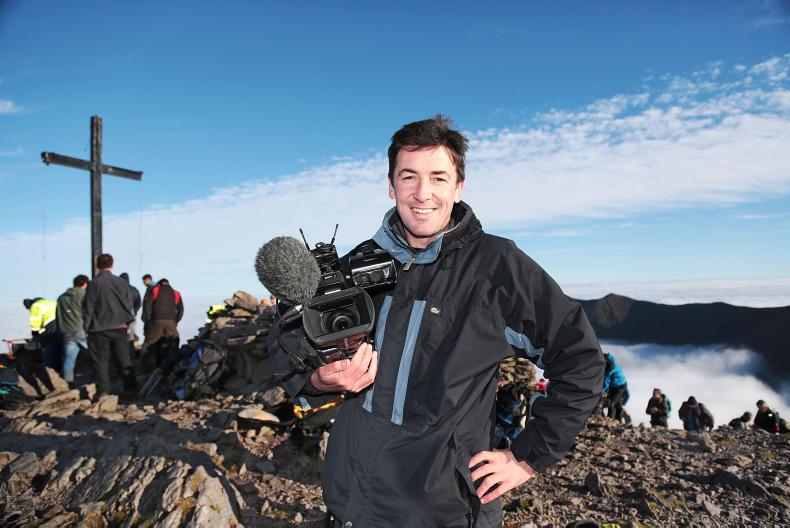You would often hear it and it is a disparaging term, talking about simple people living in rural areas. But actually, that simplicity is very complex and sophisticated because people in the city are spending vast amounts of money searching for that simplicity in life, whereas people in rural areas seem to have it clicked.”
Seán Mac an tSíthigh has seen and heard it all when it comes to rural Ireland. From the Gaeltacht village of Baile an Fheirtéaraigh in Co Kerry, Seán is an RTÉ/TG4 video journalist, primarily based in the Kerry and Cork peninsulas.
He reports from some of the most remote areas of the country, but often his stories are the most colourful and captivating. Many would consider him to be a strong voice of rural Ireland, but, in his own words, he just facilitates a medium that allows rural communities to be heard.
“I think it is important in news coverage to give communities at grassroots level the chance to have a platform to allow their voices be heard. Quite often, news coverage is, and needs to be, focused on the macro- politicians and big companies, they tend to dominate the news agenda. We don’t really hear enough, I think, of how issues are affecting people on the ground, and that is what connects with people in a story.”
Broadband
As a video journalist, Seán is effectively a one-man crew. He reports, films and edits all of his own stories, both in English and in the Irish language, which appear on RTÉ Six One, Nuacht RTÉ and Nuacht TG4. He is based at home in Kerry and praises the fact that the internet allows him to send his news packages to RTÉ and TG4. However, this arrangement is not without a problem, as looking for a decent broadband connection in the areas Seán covers is challenging, to say the least.
Seán explains that he could be in a remote valley, up a mountain or out at sea doing a story, and once he has edited the piece, he often has to drive inland to look for a secure broadband connection to send the story in time for the news bulletins. He cites this as by far the most stressful element of his job.
The gaeilgeoir believes if the rollout of rural broadband could happen sooner rather than later, it would allow more people to take up roles in their native areas, like he did.
“For any university graduate from west Cork, west Kerry or south Kerry, if you go to third-level then that means you are going to have to leave your area basically. There are no jobs for graduates on the peninsulas, very few,” he says.
“I am very fortunate that I am able to raise three young kids here at home in the Gaeltacht. While working for RTÉ and TG4, they are happy to let me base myself here and it is technology that allows that. I think that really needs to be harnessed by the Government and pushed for by communities. The rollout of rural broadband is so important and it needs to happen a lot quicker.”
Rural life
Having grown up on a suckler and sheep farm in the Gaeltacht and now working and raising a family there, Seán thinks the Irish language is alive and well. A native speaker himself, Seán feels parents now have a greater awareness of the language being under threat and understand their responsibility in fostering Gaeilge in their children.
“I think it is a nice way to ground your children and connect them with their heritage, with their people and with their landscape. It is nice to be able to continue it for another generation. We have been here for long enough, it is nice to keep it going for one more.”
Naturally, Seán is a firm believer in the positives of rural living, but firmly states that the Government needs to invest more in country communities if living there is going to continue to be viable.
“To live in places like west Cork, west Kerry and south Kerry, there are huge advantages in terms of quality of life. Okay, it is lacking services but you are not stuck in traffic, you are not sucking in dirty air and it is a great place to raise children. But unless the infrastructure is there, it is hard to get young people to stay, relocate or return.
“Unless the conditions are created to make it attractive to stay, relocate or return, it is just an uphill battle. Without people returning to raise families, the schools are under pressure and then the services follow. The population density is not there to maintain services and gradually you see the erosion within a parish; the gardaí station closes, the post office closes, shops close and pubs close. You start to lose the soul of a place then.”
Despite the challenges facing rural Ireland, the people of the peninsulas of Cork and Kerry can rest assured that their triumphs and tribulations will not go unheard with people like Seán to report them.
“I always see myself living in the countryside, living in west Kerry really to be honest,” he concludes. CL






 This is a subscriber-only article
This is a subscriber-only article





SHARING OPTIONS: